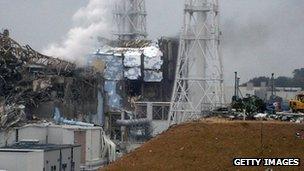Japan facing uncertain nuclear future
- Published
The last of Japan's 54 nuclear reactors will be switched off at the weekend
With Japan's last operating nuclear reactor due to go offline for maintenance, the BBC's Roland Buerk looks at the ongoing debate in the country on its nuclear future.
The Kashiwazaki-Kariwa plant was built when Japan believed in a nuclear-powered future.
There are seven reactors stretched along a vast expanse of coastline feed electricity lines that run to Tokyo, far away on the other side of the country.
They can provide up to a fifth of the needs of the vast metropolis and the surrounding region.
Inside the visitor centre a certificate is on display from the Guinness Book of Records, confirming it as the biggest nuclear power station by generating capacity in the world.
But for now it is little more than a very expensive blot on the landscape.
Big employer
In the main control room, under the clock, the electricity output display is showing zero.
The Kashiwazaki-Kariwa power station is offline - and the last of Japan's 54 nuclear reactors will be switched off at the weekend.
Before the 11 March 2011 earthquake and tsunami nuclear power provided 30% of Japan's electricity needs. Now imports of LNG and oil are being increased to compensate.

Trust is shattered after the accident at the Fukushima-Daiichi nuclear power plant
The host city of Kashiwazaki now faces the same choice as other local communities in the shadows of nuclear plants - between the need for jobs and the fear of being blighted by a disaster, like those who lived around Fukushima.
The power station is a big employer - up to 10,000 people including contractors could be working on any given day.
There are limited employment opportunities in the surrounding area, which is the reason an earlier generation of city fathers wanted it here in the first place.
There is no other major industry and the main street is faded, apart from the new Tepco Plaza, named for the Tokyo Electric Power Company, the town's main benefactor.
'Trust shattered'
"We have coexisted with the nuclear power plant and it was a given that it was safe," said Mayor Hiroshi Aida.
"But with the accident we found out it might not be. So we cannot take it for granted that the nuclear power plant is absolutely safe.
"We need to think of that as the citizens of this city. That's the biggest worry for us here. Our trust for the government and the people running the plant has been shattered."
Shiro Arai, deputy site manager at Kashiwazaki-Kariwa, said safety issues were paramount.
"The purpose of the power plant is to generate electricity. But our company is responsible for the Fukushima power plant, where the accident happened," he said.
"Above all what is most important for nuclear power plants is safety. Safety comes first before anything, before operating a plant. We all feel the same way."
The government - mindful of the energy challenges facing the country - has been working hard to try to get trust back.
Nuclear reactors have been put through a series of stress tests, designed to check their resistance to natural disasters like earthquakes and tsunamis.
Ministers have been despatched to talk to officials from local governments about restarting operations.
But they have been unable to avoid what is happening this weekend, the last nuclear reactor, in Tomari in Hokkaido, going offline for routine maintenance before any have been restarted.
Japan will be entirely without nuclear power for the first time in more than 40 years.
Local governments do not have a veto under law but they have always been consulted in the past as a matter of courtesy.
The government wants to proceed now on the basis of consensus rather than compulsion - but the cost to Japan's economy is high.
'Cheaper energy' needed
A dramatic increase in imports of gas and other fossil fuels helped push the country into its biggest ever trade deficit last year.
Seafarers say they have never seen the gas terminal on Tokyo Bay so busy.
One worker has described the moment the buildings exploded, saying the accident was beyond imagination.
It has enabled Japan to avoid black-outs but at a price - more expensive electricity for industry.
"The Japanese economy depends on huge and advanced manufacturing. The manufacturing sector needs cheaper energy," said Yu Nagatomi from the Institute of Energy Economics Japan.
"The industrial sector may be afraid that the situation makes it difficult to produce their materials in Japan, domestically. They may think it is a better way to keep their business to get out of Japan."
At Kashiwazaki-Kariwa they are constructing huge new sea walls - big enough, they say, to withstand any possible tsunami.
But the Japanese were told the Fukushima Daiichi power station was safe only to see to see it tipped into meltdowns.
Akihiro Harako, one of the workers at the Fukushima plant who struggled to control the crisis in the aftermath of the tsunami, said lessons had to be learned before public trust was restored.
"For 40 years, we've been running our nuclear power plant safely. We believe we've contributed to providing energy to the country.
"But there's been a regrettable accident. Operators inside Japan and outside need to learn from it to run power plants safely. As for the existence of nuclear energy in Japan, I think we need to discuss it widely in the future."
Convincing people now will not be easy.
- Published26 March 2012
- Published5 March 2012
- Published11 March 2012
- Published10 March 2012
- Published26 December 2011
- Published2 November 2011
- Published12 March 2011